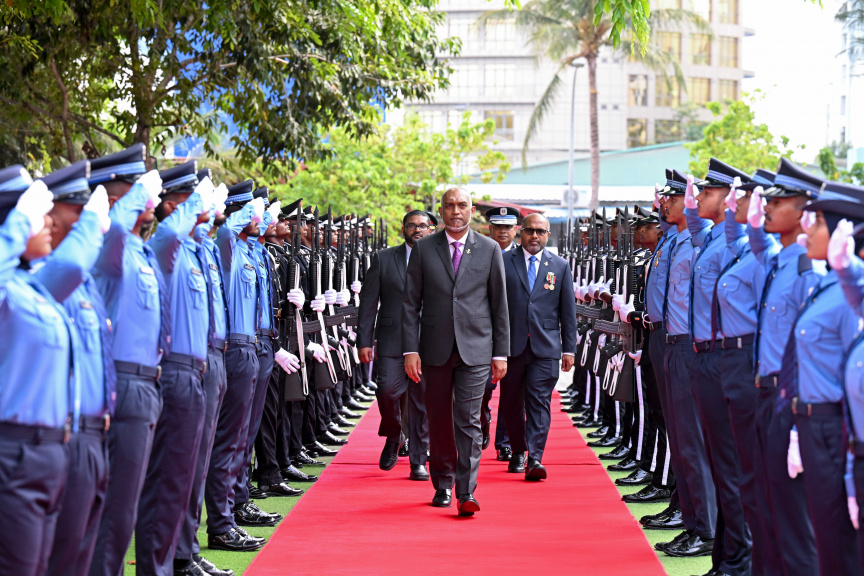
President Dr. Mohamed Muizzu (C) is flanked by Home Minister Ali Ihusan (R) and Defense Minister Mohamed Ghassan Maumoon (L) as he receives an honor guard on July 26, 2025. (Photo/President's Office)
People have taken to social media platforms to express support towards the proposal floated by President Dr. Mohamed Muizzu on scaling back financial perks by the state to former presidents and parliamentarians, while also urging him to expand cost cutting measures to cut perks to security services personnel and judges, and to also reduce the number of political appointees.
President Muizzu had floated the idea of scaling back financial perks to former presidents and parliamentarians in a message he sent to a WhatsApp group for the members of the PNC parliamentary group over the weekend.
“This is the will of the people. And we are the representatives of the people. Their servants,” he wrote.
News of the potential measure sparked social media buzz on not just the merits and cons of such a move, but also regarding what else can be done to cut costs.
Many of the netizens who shared news reports of the proposed change spoke in favor of it. Many believe this is an “urgently needed” change. And some even suggested cutting financial perks to former presidents and parliamentarians altogether, instead of just scaling it back.
Some also urged the government to cut perks to police officers and soldiers, as well as to judges, and to reduce the number of political appointees hire to various government institutions and companies.
Some key opinions:
“Perks to former parliamentarians and presidents should be abolished. The pay of the incumbent president and parliamentarians should be cut by half. Health insurance to the family members of police and soldiers should be stopped, wrote Ali Hashim, in a Facebook post that has over 80 likes.
“Don’t just scale it back. Cut it off altogether. Serving a five-year term does not entitle them to being given perks from the state coffers for the rest of their lives, wrote Mohamed Siraj, in a Facebook post that has over 40 likes.
“That’s is more like it. This is long overdue,” wrote Sham Ali Yoosuf, in a post on X.
“This is a good initiative. And with this, these bots serving MVR 20,000-MVR 30,000-salary political posts who have neither an office to go to nor a desk to sit at need to be dismissed. If there’s any level of sincerity at all… Financial institutions have been issuing monthly warnings to cut these kinds of costs,” wrote Ahmed Thithi on Facebook.
“I believe that this path should also be taken in the matter of police and soldiers,” wrote someone commenting on Sun’s article regarding the proposal.
ތިކަން ކުރަން މާބޮޑަށް ވެސް ލަސްވެއްޖެ.
— Ɣırʋs????Eᴄɴᴇᴀsᴇ???? (@ECNEASE) September 8, 2025
ކުރީގެ ރައީސުންނާއި، ކުރީގެ މަޖިލިސް މެންބަރުންނާއި، ކުރީގެ ފަނޑިޔާރުންނަށް ރައްޔިތުންގެ ޓެކްސް ފައިސާ އިން ދޭ އެލަވަންސްތައް މިހާރުން މިހާރަށް ކަނޑާލަން ޖެހޭ.
ކަލޭމެންވެސް އަހަރުމެން މިއުޅޭހެން ރީތިކޮން ޙަލާލު މަސައްކަތް ކޮށްގެން ކައިގެން… https://t.co/8pCRCRWuHY
Perks to former presidents
Financial perks for former presidents were introduced in 2009. As such, president who served a single term get a monthly allowance of 50,000, while those who served two receive MVR 75,000. They also receive MVR 50,000 as a living allowance, and MVR 175,000 to cover office expenses.
The Maldives currently has five former presidents who receive these perks.
Perks to former parliamentarians
Financial perks to parliamentarians were introduced in 2013.
Former parliamentarians are entitled to receive financial allowances and other perks, including health insurance, once they reach the age of 55. Those who served a single term are entitled to 30 percent of their monthly salary, while those who served two or more are entitled to 45 percent.
A document that recently went viral on social media platforms shows the state spent MVR 18.9 million on health insurance for former parliamentarians between 2014 and May 2025.
Spending on judges and security services personnel
Judges and security services personnel receive a huge retirement package. Like parliamentarians and their families, police officers and soldiers, along with their families, enjoy coverage for their medical expenses, coverage that goes beyond conventional health insurance plans to include cosmetic procedures and other treatments.
The government had also attempted to address the issue of double pensions, and had even included pension reforms in the 2025 budget. But it dropped the planned changes following pushback.
Spending on political appointees
According to information released by the President’s Office in July, there are 922 officials appointed to political positions.
This includes:
The government’s spending on salaries has been increasing yearly, making it a huge burden on the state, and fueling appeals for the government to cut down wastage.